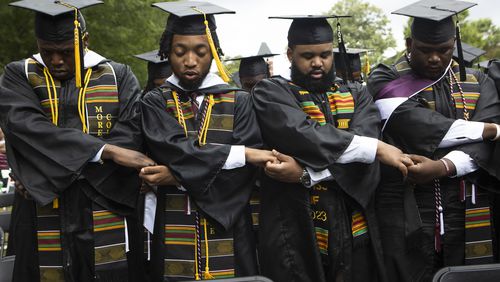Fred A. Jones Jr. is the senior director of public policy and advocacy for the Southern Education Foundation, a 156-year-old organization based in Atlanta. He lives with his family in Augusta and has a child enrolled in Georgia’s public school system.
In a guest column, Jones advises the Georgia General Assembly to look at education from pre-K through college and assure all levels have the funding and supports they need to succeed. His column is part of an Atlanta Journal-Constitution series in which education advocates set out an agenda for the 2024 General Assembly, which starts on Jan. 8.
By Fred A. Jones Jr.
As we begin the 2024 legislative session, Georgia leaders need to invest in and transform our education system to meet the unique needs of each student. Instead of segmenting early childhood, K-12, and higher education, legislators should frame and fund youth development in a way that comprehensively supports students’ individual educational pathways and supports them through the critical transitions in their young lives.
Make early childhood education more affordable. Decades of research show that thoughtful investments in accessible, high-quality early childhood education can increase children’s academic readiness, cognitive development, and overall wellness. Young learners ages birth to 5 who have high-quality early learning experiences also have higher rates of college enrollment and employment in adulthood, yielding annual returns on public investment as high as 13%.
Beyond the benefits of early learning, many Georgia families simply cannot afford child care, limiting parents’ ability to work. The average yearly cost for infant care in our state is nearly $9,000 — higher than the average tuition and fees at our state universities and more than half of the cost of the average Georgia home mortgage payment. Ideally, child care costs should not exceed 7% of a family’s discretionary income.
Credit: Contributed
Credit: Contributed
Georgia should also expand eligibility for state child care subsidies to more families with extremely low incomes. The current eligibility rate is one of the worst in the nation. The state also should boost reimbursement for child care providers so they can afford to pay more competitive wages. Higher reimbursements would also help alleviate severe staffing shortages and lack of providers in some communities.
Also, a majority of our state’s 3- and 4-year-olds are not enrolled in state pre-K classes. In fact, Georgia has fallen behind Florida and other states in the rate of 4-year-olds enrolled in state pre-K programs (55% in Georgia vs. 68% in Florida). The state must expand pre-K to allow both 3- and 4-year-olds to enroll, with an emphasis on children from low-income families who often start school behind.
Update the K-12 public education funding system. Georgia continues to be one of six states that do not consider poverty as a factor in the state’s school funding formula. An “opportunity weight” that allocates funding for each student living in a low-income household should be one of the highest priorities. We know that financial resources matter in the opportunities schools can offer, and targeted investments for personalized learning, smaller classroom sizes, and recruiting and retaining a high-quality, diverse educator workforce. Adding an opportunity weight would target more resources where they are needed the most, leading to better student outcomes.
State leaders must also deal with the expected fiscal cliff when federal pandemic-relief funds for schools expire. The negative impacts of the pandemic persist even as this funding ends: By some estimates, nearly 15,000 children in Georgia lost primary caregivers due to the pandemic. Students’ mental health must remain a priority throughout our education system. Many students need a range of wraparound services, both academic and nonacademic, to address the challenges that the pandemic only exacerbated.
Last year, the Legislature considered a universal school voucher program that would have redirected billions of state dollars from public schools to private schools. The bill would have also created a legal mechanism for anti-civil rights violations. The proposal was defeated last year for several reasons, including the massive financial impact it would have had on local school districts, particularly in rural communities. Legislators should focus on improving and supporting our state’s public education system instead of creating a separate education system that lacks credible evidence and research on improving students’ academic outcomes.
Support HBCUs and student success. Legislators should continue building on their collaborations in 2023 to support Georgia’s historically Black colleges and universities.
Last year, a Senate study committee chaired by state Sen. Sonya Halpern of Atlanta traveled the state to learn more about Georgia’s HBCUs. The committee found that HBCUs are often the best value in higher education, providing strong learning communities, investing in students’ growth beyond the classroom, and helping large proportions of Black students (many of whom attended under-resourced K-12 schools) earn their degrees at higher-than-average rates.
The Senate study committee also detailed in its report that with the right investments, HBCUs can become stronger economic engines for the state. Modest new investments in these institutions, which often lack larger endowments in comparison to the state’s flagship university, could help them serve more students and develop new housing and small businesses in HBCU communities.
A recent study by the Century Foundation clearly outlines the funding disadvantages for HBCUs, especially land-grant institutions such as Fort Valley State University. Several HBCU alumni in Georgia have filed a federal lawsuit against the state, seeking hundreds of millions of dollars to correct historic funding inequities in the state. The state’s underinvestment in Fort Valley State has resulted in a funding gap of about $600 million over the last three decades alone, compared to levels the state would have provided if resources had been allocated fairly.
Legislators should also consider forming an HBCUs subcommittee as an official forum for legislation on the needs of these institutions and their potential to make a greater impact on our state and future leaders. Important steps like this could lead to greater opportunities for Georgians to be prepared for high-demand careers in technology, advanced manufacturing, teaching, and nursing.
These recommendations for legislative action in 2024 across the education spectrum are not just a wish list. They are essential steps that will help every corner of our state thrive, grow more economically competitive, and help Georgia remain a top state for business. This year, state leaders have an opportunity to make the people’s priorities for education their own.








